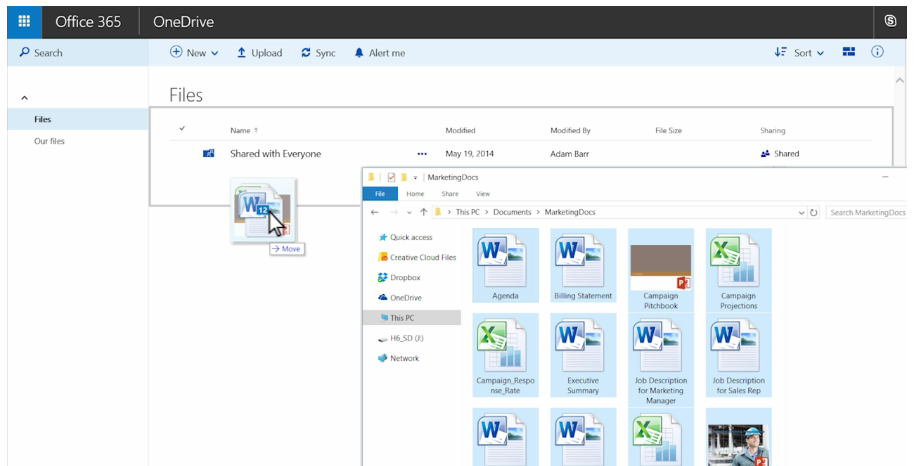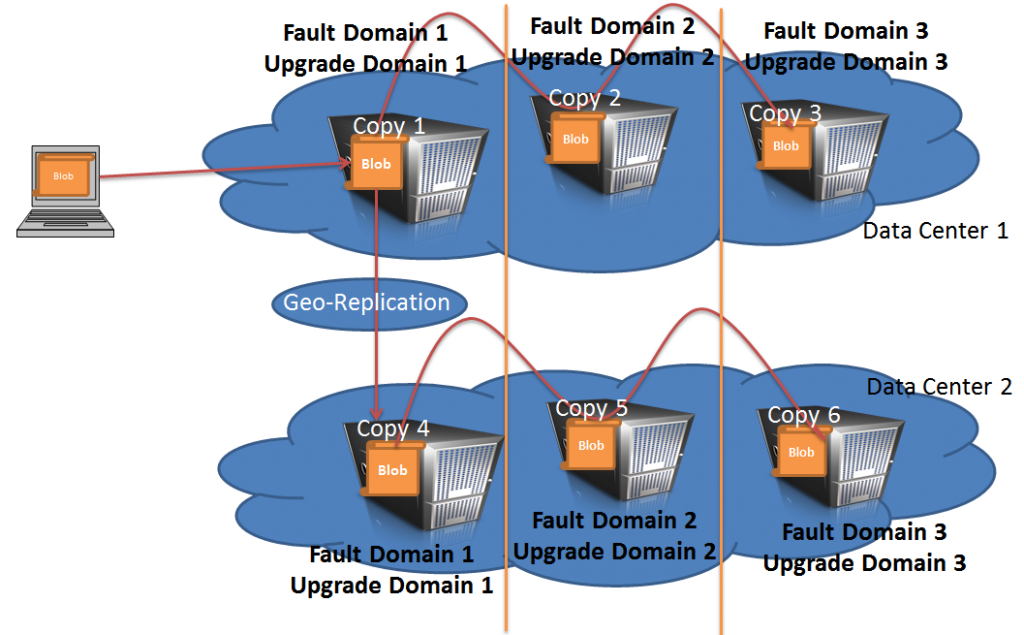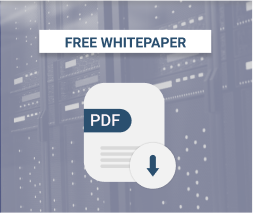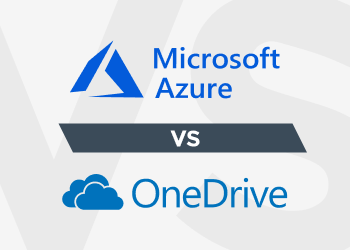Since Windows-based solutions are so popular all over the globe, Microsoft is naturally interested in providing its users with native cloud storage tools for their data. You must have already heard about two of them: OneDrive and Azure Storage. In this article, we will explore their differences and try to find out which one is better.
Table of Contents
Working with OneDrive
OneDrive storage is a default solution for Windows users. It is integrated into Windows 8, 8.1, RT 8.1, and 10. Some basic MS products such as Office are integrated with OneDrive so that it is available as an option when saving documents. But this local OneDrive folder needs to be synchronized with cloud storage, enabling a user to manage files both locally and in the cloud.
In order to activate cloud storage, users have to log in to OneDrive.com website with their Microsoft account. Similar to Amazon Drive or Google Drive, it has some initial storage (5 GB ) available for free, but further expansion comes at a price. The basic plan offers 50GB limit at $1.99/month and other plans offer even more storage capacity. OneDrive for home users does not include a guaranteed quality-of-service level, but you can get SLA with OneDrive for Business. Let us summarize the differences between both editions in the following table:
| OneDrive | OneDrive for Business | |
| Storage limit | 50GB | 1TB (can be increased for 5 user subscriptions) |
| Price per user | $1.99 per month | Starts at $6.99 per month |
| Free tier | Yes | Trial Only |
| SLA | No | 99.9% uptime, 24/7 phone support, and protection of user data from unauthorized access. |
| Data protection tools | No | Available for advanced subscriptions |

Free OneDrive does not provide any specific tools for cloud backup or file versioning. Archived data can be stored in OneDrive together with other files and documents, but in order to prevent losses, Microsoft recommends its users to create offline backups and save file versions with the help of Windows built-in features. Additionally, the In-Place Hold feature is available for the advanced Business plan, which preserves the original state of OneDrive storage after editing or deleting its files.

We don't recommend to back up your data to Microsoft OneDrive and OneDrive for Business, which is why we do not support these solutions in our MSP360 Backup software. Check the list of supported solutions.
Working with Azure
Cloud storage is one of the basic services available at Azure dashboard to any registered user. There are two storage classes: Standard and Premium. The latter is designed only for Azure Virtual Machines, so it cannot be compared to OneDrive. The Standard class supports the following services:
- Blob storage of binary files, documents or media data
- Table storage: NoSQL data
- Queue storage for messaging
- File storage for legacy applications
Blob storage service organizes data uploaded to Azure into objects called 'blobs', which can be used for storing backups:/p>
Further reading Azure as a Backup Storage Destination
The total volume of blobs created by a single user can be up to 500TB. Data can be retrieved from the 'Hot' (frequently accessed) type of storage for free, but the user will be charged for uploading and storage usage.
Azure's Standard storage ensures redundancy of uploaded data, which level must be chosen before creating a backup. For example, choosing the Locally Redundant level will result in storing three copies of an object within a single facility, while the Geo-Redundant level means that six copies will be kept in two different locations. The more remote copies are, the less the risk of data loss is. Besides, Azure supports file versioning to prevent data loss and has SLA with 99.9% processing success guarantee with about 98% of monthly uptime.
Microsoft Azure has expanded their Azure Blob Storage to the several tiers, so users can store several types of data there - data, which needed to be accessed frequently (Azure Blob Hot Storage), data with less frequent access needs (Azure Blob Cool Storage) and data, that you need to preserve for archiving needs (Azure Blob Archive Storage). Each tier is consequently cheaper to store files in, and consequently more expensive to recover.
Azure has no features for working offline, and it does not require client installation. By default, its users perform all operations with their storage via the standard online dashboard. However, you can use third-party desktop solutions such as MSP360 Explorer for Microsoft Azure with the full support of Azure Storage to manage your data there.

Further reading Guide to Backup Management for MSPs
Which One Is Better and When?
OneDrive is a lightweight online storage with a free tier of services suitable for home use. Azure Storage is a much more durable solution with a hierarchy of service tiers. However, this comes at a price.
In order to compare MS Azure to OneDrive, we will explore several important parameters:
| OneDrive | Azure Storage | |
| First start | Pre-installed in the latest Windows versions. Users can activate OneDrive accounts via their existing Microsoft registration | Available after a separate registration in Azure system |
| Benefits for SMBs | Targeted at individual customers mostly, but offers a special OneDrive for Business subscription plan making it possible to increase the storage limit up to 5TB for one user | Offers 500TB for single storage with a broader set of management options (lifecycle management, secure import/export via Azure data center) |
| Integration with MS Office | Available as an option for saving MS Office files, so they could go directly to the cloud | Does not provide special services for MS Office apps |
| Durability | Offers file versioning for MS Office documents and quality-of-service guarantees only in Business version | Redundancy options for data backups, file versioning, and lifecycle management |
| SLA | Only for Business version: 99.9% uptime, 24/7 phone support, and protection of user data from unauthorized access | Data read & write requests will be served successfully for 99.99% of the time, about 98% of monthly uptime |
| Price | Offers subscription plans with fixed monthly payments, starting at $1.99 per month for up to 50GB of storage available | Charges users for each GB of data stored, starting with $0.00099 per month. An additional fee is applied when uploading and modifying files |
| Backups | Doesn't offer any special backup service or storage | Has a special Cloud Backup service. It stores backup data in special storage for infrequent access with extended protection and security |
| Native offline work | Yes (synchronization) | No |
So for home use, especially for beginners, it is better to try out OneDrive with its free 5GB storage option. But small and medium businesses dealing with several times bigger data volumes need more storage space and data safety options. Azure redundancy and advanced backup management would be the best choice for them.
Further reading Guide to Backup Storage Management for MSPs









